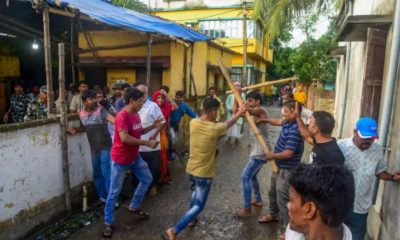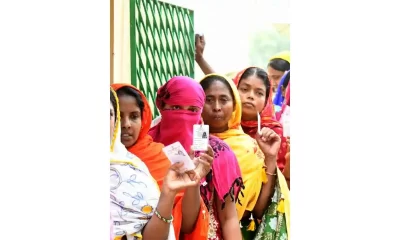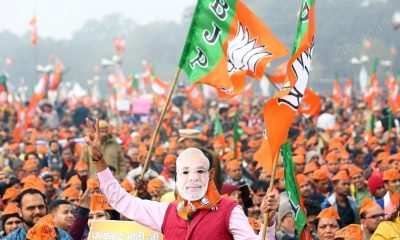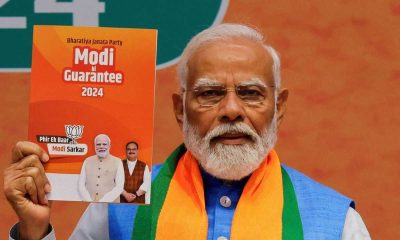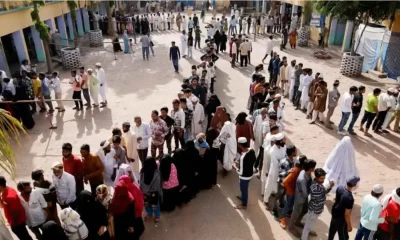India News
Why the BJP is (over)confident that it will win in UP

[vc_row][vc_column][vc_column_text]A blinkered view gives a pretty picture where the party accesses large sections save Muslims
By Parsa Venkateshwar Rao Jr
There is little doubt that the Bharatiya Janata Party (BJP) is emotionally, ideologically and politically invested in Uttar Pradesh. The most populous state is at the heart of the Hindu heartland. BJP does not fight shy of the fact that it is a Hindi heartland party. As a matter of fact it wants to flaunt it even.
Prime Minister Narendra Modi has set his heart on UP from 2013 onwards when he was declared the prime ministerial candidate of the party in the 2014 Lok Sabha election. First, he chose to contest from Varanasi, with its unmistakable Hindu connection. Then he deputed Amit Shah, his Gujarat confidante to focus on UP in 2014. The strategy seemed to have paid off. The BJP won 73 of the 80 Lok Sabha seats in the state. It was natural that Shah was credited with the success of the BJP juggernaut in UP, and he was rewarded by making him the president of the party.
Now, both Modi and Shah want to prove that they have grown roots in UP. As one of Modi’s cabinet ministers said on condition of anonymity, “We (the BJP) want to prove that 2014 Lok Sabha election was no fluke.” So, Modi, Shah and the rest in the party are sparing no effort to win in the state. Shah’s constituency by constituency, booth by booth – BJP leaders lay much store by their booth management skills – approach which paid dividends in 2014 is ostensibly replicated this time round. And it is believed that it will work a second time round. What the BJP fails to understand is that it is not the thoroughness of the preparation alone that matters, and that it depends on more than anything else it depends on the preference of the people as such.
Apart from the desire and determination to win UP, the BJP strategists also seem to believe that they have been dealt a winning hand as it were when the electoral cards were shuffled. They think that the political appeal of Samajwadi Party (SP) is confined to its core constituency of Yadavs and not to the whole spectrum of the backward classes/castes, and that of Bahujan Samaj Party (BSP) to Jatavs and not to Dalits in general. Another Union minister, who gives the spin to the BJP thesis, says that half of the Muslim vote would go to the SP, and the other half to BSP.
In contrast, the minister arguing the case of electoral prospects of the party said that the upper castes are with the BJP, and so are the various segments of the other backward classes/castes and the remaining Dalits, the Valmikis. Of course, it is a big presumption. Even if it is assumed that many of backward class segments would not go with the SP, and therefore could vote for BJP because Congress, the other big national party in the fray in the state, is not a big players anymore and it has reduced itself to the status of a junior alliance partner to SP, the big local players. There is also the possibility that the BJP would want to choose a candidate from one of the non-Yadav backward classes as a chief ministerial candidate. But rivalries between the many non-Yadav backward classes/castes are conveniently ignored by the BJP spinmeisters. It is also not clear as to why the non-Jatav Dalits, the Valmikis, should choose BJP because they have not much to gain from the bargain. The BJP will not be able to please them all with the temptation of office.
What is interesting in the BJP is argument is that there is ideological thrust to the campaign though there is a subtle and not-so-subtle Hindutva or Hindu communalism at play here. The BJP is reconciled to the fact that Muslims will not vote for it, and so it does not factor in Muslims in its caste/community electoral calculus. If the BJP leaders are embarrassed about it, they do not show it. But they are displaying hard-nosed political realism by not counting on Muslims, but they are overstating their case by assuming that the Muslim would split, almost in half between the SP and BSP.
The other big assumption of the BJP, and even that of the pollsters, is that it is not a three-cornered contest where SP-Congress, BSP and BJP are all equal contenders and that that the vote would split three-ways. The complexity is simplified by reducing BSP into a distant third, and that it is essentially a contest between SP-Congress on the one hand and the BJP on the other. It is not even being contended that it could be a battle between BJP and BSP. This is a grudging recognition by the BJP that Akhilesh Yadav has clawed his way back into the contest.
Though there are some who are arguing that the BSP is the silent player which would steal the show on Saturday, there seems to be no reliable or tangible proof that the BSP outreach to the other castes and communities is gaining traction or not. This does not mean that BSP has failed to reach out beyond its core constituency. It just means that the pollsters have failed to detect it. Even the ardent supporters of BSP in media have not argued convincingly enough that a significant number of Muslims and Brahmins have been won over by party of Dalits. There is of course the plausible inference that Muslims are not too happy with SP post-Muzaffarnagar riots of 2013.
There are enough chinks in the constructed political armour of the BJP, which could turn out to be a sour point on Saturday.[/vc_column_text][/vc_column][/vc_row]
2024 Lok Sabha Elections
Lok Sabha Elections: Voter turnout 62.02% in Tamil Nadu till 5pm
The voter turnout in Tamil Nadu stands at 62.02%, while Uttar Pradesh records a turnout of 57.5%. Meanwhile, in West Bengal, voter participation surges to 77.5% as of 5 pm.
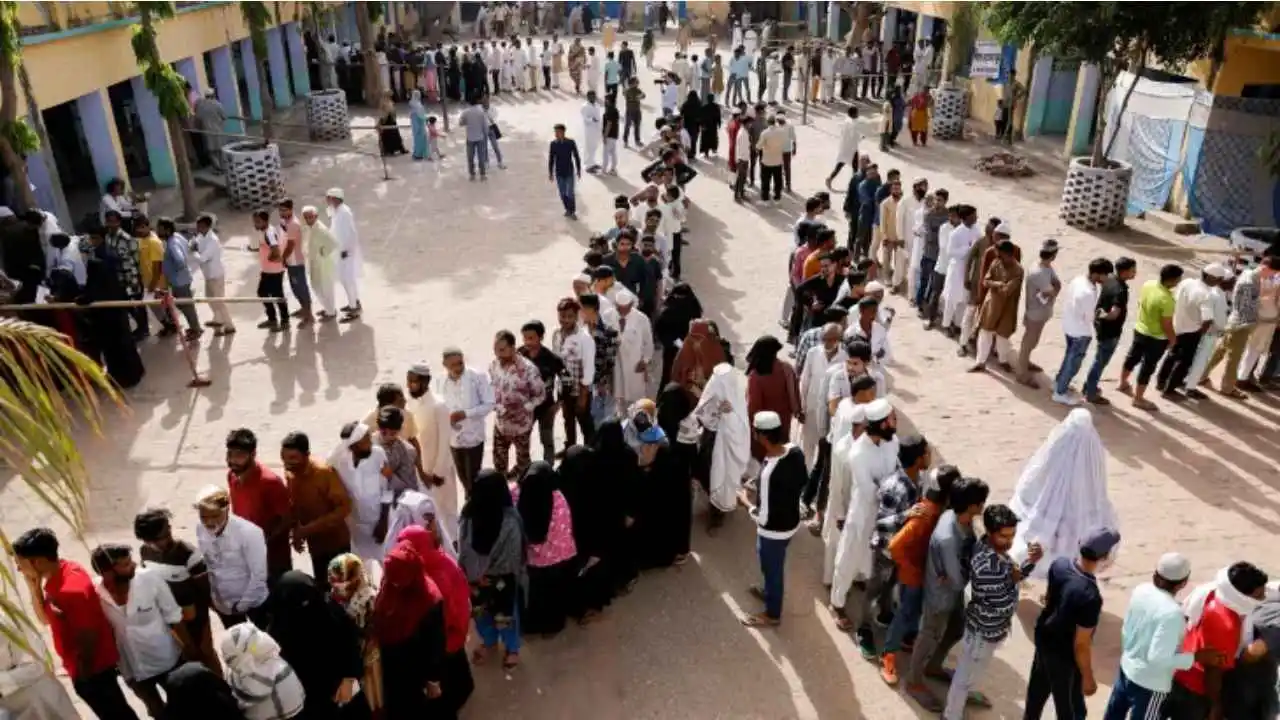
The Lok Sabha elections 2024 began today, marking the onset of the world’s largest electoral event. Voting ended in all 39 Lok Sabha constituencies in Tamil Nadu with a total voter turnout of 62.02%. State BJP chief and Coimbatore Lok Sabha constituency candidate K Annamalai said, they were getting complaints from a large number of voters that their names were missing from the voters’ list.
This incident happened in many places. Annamalai said they are demanding re-poll in places where the names of a large number of voters were missing.He said they had a doubt that there was some political interference because the names of a large number of BJP caders were missing from the voters list.
The voters in South Chennai showed lukewarm interest to participate in the election process and had a total voter turnout of 57.04% till 5pm. Although the overall percentage is poor, some areas like Thiruvanmiyur witnessed brisk polling from 7am onwards. Elderly, middle aged and young voters turned up and it was a family outing for many as they cast their vote.
Corporation volunteers assisted senior citizens with wheelchairs and guided them to their respective polling booths. The hot weather also had an impact on the polling as it reduced the voter turnout as many booths in the corporation school in MGR Nagar were seen deserted around noon. Senior citizens showed courage as they reached the polling booths in private vehicles to exercise their franchise.
Most of the polling booths had shamianas for voters so that they could wait in a queue. Some people even found refuge in the nearby buildings to save themselves from the scorching heat. The polling officials gave instructions to the voters to keep their phones switched off while they exercised their franchise. The security personnel at the polling booth also regulated traffic outside the polling booth in MGR Nagar.
2024 Lok Sabha Elections
Deserted by key supporters, the Kamal Nath story looks set to wind to an end in Chhindwara
Nath’s closest allies in his near 50-year reign—Deepak Saxena and Kamlesh Shah—have deserted him. His local team of corporators has also decided to jump ship leaving a gaping hole in Nath’s campaign trail.
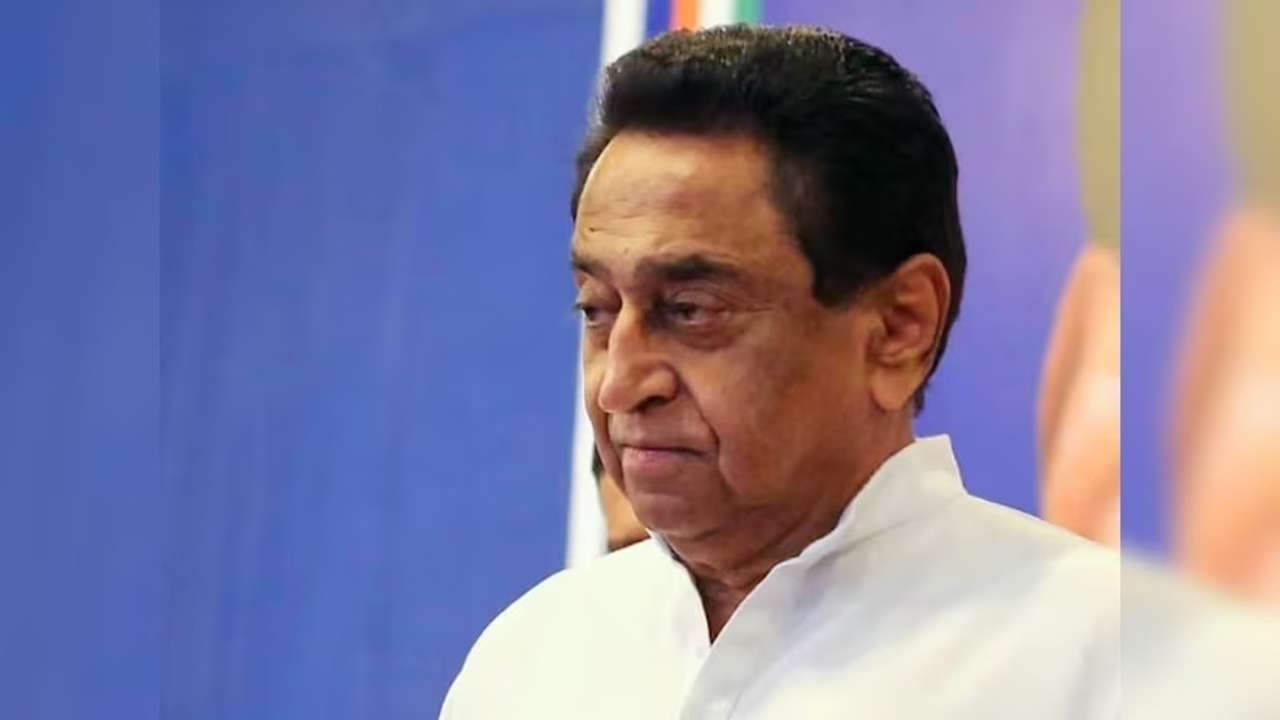
By Neeraj Mishra
The Congress has lost Chhindwara only once since Independence when the wily Sunderlal Patwa was sent there by Atal Bihari Vajpayee to test Kamal Nath’s hold on the constituency. Patwa won the 1997 by-election by a slim margin in the backdrop of Nath having forced his wife to first contest and later vacate the seat for him. Nath, however, returned to his winning ways the very next year and has won the seat nine times.
It seems possible that Chhindwara, the lone surviving Congress seat, will be lost again this time and may be forever. A day ahead of polling, the town was drowned in saffron. Not so much the effect of vigorous campaigning by Vivek Sahu of the BJP but the Ram Navami festival which brought out saffron flags on every rooftop. The effect is likely to last since the polling is today. At 77, Nath is unlikely to contest another election here and his son Nakul seems like a pale shadow of his father unable to even make a forceful speech. The days of running Chhindwara from Shikarpur kothi are gone.
Nath’s closest allies in his near 50-year reign—Deepak Saxena and Kamlesh Shah—have deserted him. His local team of corporators has also decided to jump ship leaving a gaping hole in Nath’s campaign trail. Nakul had won by a margin of 37,000 votes in 2019 and the biggest lead had come from Kamlesh’s Amarwada Assembly segment. With Saxena in control of Chhindwara and forced to show his strength in his new party, it is highly likely that Nakul will not be depending on these segments. Instead, the Congress campaign was focused on Pandhurna, Parasia and Chaurai.
Amit Shah was in the region a couple of days ago and warned all BJP workers—old and new—against lethargy. His message was clear, the BJP wants all 29 seats this time. Cabinet Minister Kailash Vijayvargiya is camped here and using all his political acumen for the desired results. One such tactic was to raid the Shikarpur Kothi of Kamal Nath for his assistant Miglani who handles almost everything for him. With Miglani temporarily neutralised, BJP is best placed to repeat its win in Chhindwara in 1997.
2024 Lok Sabha Elections
Lok Sabha Elections 2024: Nearly 40% voter turnout till 1pm
Chennai recorded an average voter turnout of 34% as of 1 pm on Friday. According data released by the Election Commission of India, Chennai (North) recorded 35%, Chennai (Central) recorded 32.3% and Chennai (South) recorded 34%.
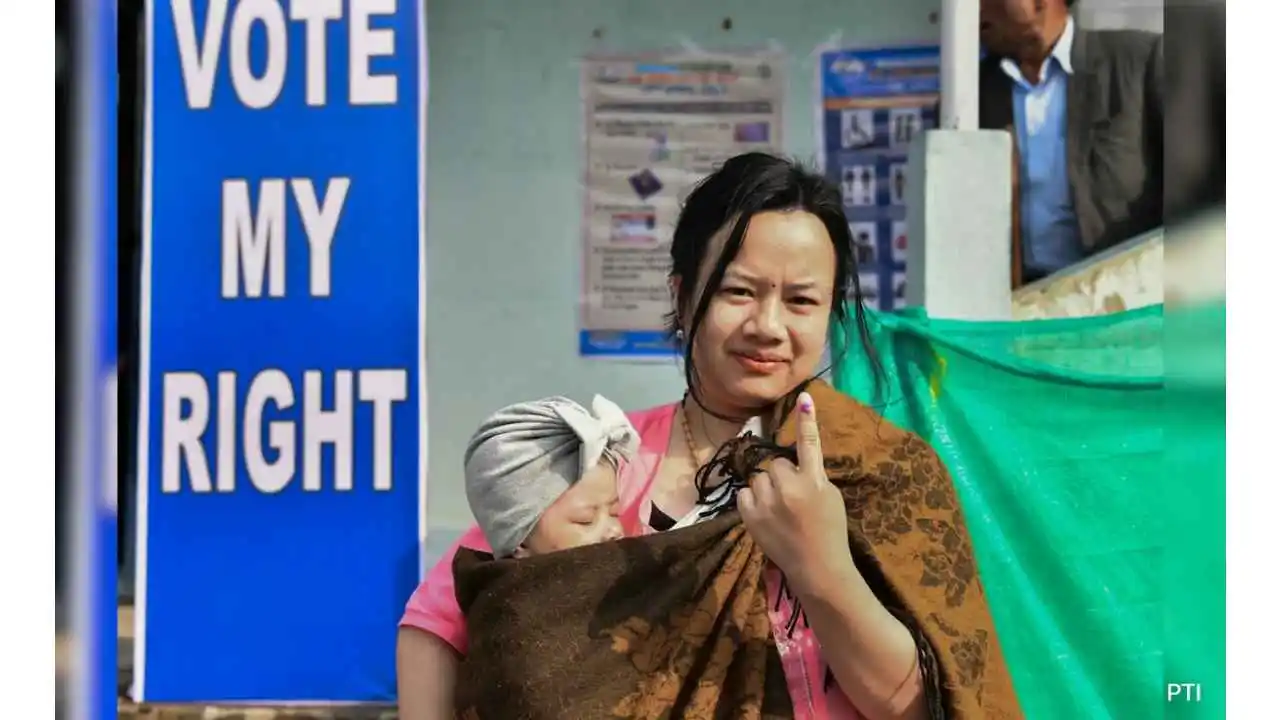
The first phase of voting for the 18th Lok Sabha elections started taking place in 21 states and Union territories on Friday. Nearly 40% voter turnout was recorded till 1pm across the states. Seats in Assam, Arunachal Pradesh, Chhattisgarh, Bihar, Maharashtra, Madhya Pradesh, Manipur, Mizoram, Meghalaya, Rajasthan, Nagaland, Tamil Nadu, Sikkim, Uttar Pradesh, Tripura, West Bengal, Uttarakhand, Jammu and Kashmir, Andaman and Nicobar Islands, Lakshadweep and Puducherry go to elections on Friday.
There has been a substantial increase in the voter turnout charts across the Northeast states, with Tripura leading at 53.04% until 1 pm, as per the data released by the Election Commission of India. Other northeast states like Manipur (46.92%) and Meghalaya (48.91%) are also witnessing high voter turnout. After Tripura, West Bengal is experiencing a high voter turnout of 50.96%.
Chennai recorded an average voter turnout of 34% as of 1 pm on Friday. According data released by the Election Commission of India, Chennai (North) recorded 35%, Chennai (Central) recorded 32.3% and Chennai (South) recorded 34%.
Over 33% voter turnout was recorded in the first 6 hours of voting on Friday in 12 parliamentary constituencies of Rajasthan. According to the Election Commission, voting started at 7 am amid tight security arrangements and 33.73 % voting took place till 1 pm. The highest voter turnout of 40.72 % was recorded in the Ganganagar Lok Sabha seat while Karauli-Dholpur saw the lowest turnout of 28.32 %. Jaipur recorded a poll percentage of 39.35 %.
Over 37 % voter turnout was recorded till 1 pm in the Lok Sabha election being held for five parliamentary constituencies in Uttarakhand on Friday. Elections began at 7 am and the five constituencies recorded an overall poll percentage of 37.33 % up to 1 pm. The Nainital-Udham Singh Nagar seat recorded the highest turnout of 40.46 %, followed by Haridwar with 39.41%, Pauri Garhwal with 36.60 %, Tehri Garhwal with 35.29 % and Almora with 32.29 %.
-

 Entertainment22 hours ago
Entertainment22 hours agoDo Aur Do Pyaar social media review: Social media users say Vidya Balan, Pratik Gandhi deliver standout performances in this adorable film
-
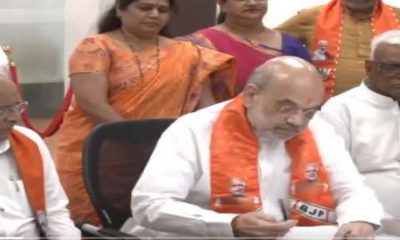
 2024 Lok Sabha Elections22 hours ago
2024 Lok Sabha Elections22 hours agoLok Sabha elections 2024: Amit Shah files nomination from Gandhinagar
-

 Entertainment23 hours ago
Entertainment23 hours agoYami Gautam starrer Article 370 releases on Netflix today
-
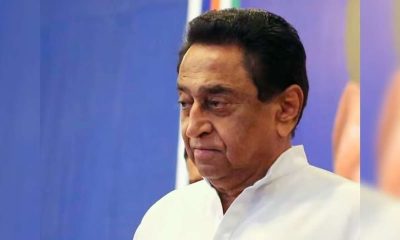
 2024 Lok Sabha Elections18 hours ago
2024 Lok Sabha Elections18 hours agoDeserted by key supporters, the Kamal Nath story looks set to wind to an end in Chhindwara
-

 Entertainment20 hours ago
Entertainment20 hours agoAditya Roy Kapur, Sara Ali Khan’s Metro In Dino to release this November
-
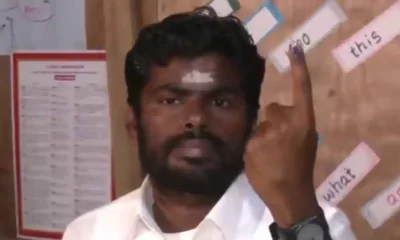
 2024 Lok Sabha Elections24 hours ago
2024 Lok Sabha Elections24 hours agoTamil Nadu BJP chief K Annamalai says party will sweep Karnataka and emerge victorious in Telangana, accuses DMK, AIADMK of influencing voters in Coimbatore
-

 2024 Lok Sabha Elections24 hours ago
2024 Lok Sabha Elections24 hours agoLok Sabha elections 2024: Newly married couple cast vote in Jammu and Kashmir’s Udhampur, video goes viral
-
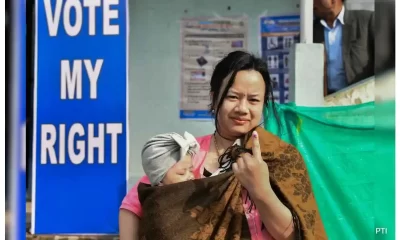
 2024 Lok Sabha Elections20 hours ago
2024 Lok Sabha Elections20 hours agoLok Sabha Elections 2024: Nearly 40% voter turnout till 1pm

